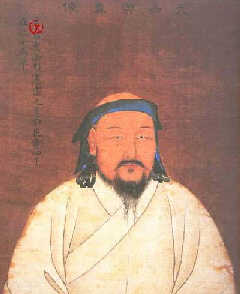 Kublai Khan, named Hu Bilie, was the founder of China's Yuan Dynasty (1271-1368). Born in 1215, he was the second son of Toluia and Sorghaghtani Beki and the grandson of the great Mongol conqueror, Genghis Khan. Kublai's mother raised him and his three brothers after their father's death.
Kublai Khan, named Hu Bilie, was the founder of China's Yuan Dynasty (1271-1368). Born in 1215, he was the second son of Toluia and Sorghaghtani Beki and the grandson of the great Mongol conqueror, Genghis Khan. Kublai's mother raised him and his three brothers after their father's death.
He began to play a major role in the consolidation of Mongol power in 1251, when his brother, the emperor Mongke, resolved to complete the conquest of China. He therefore vested Kublai with responsibility for keeping order in conquered territory. After Mongke's death in 1259, Kublai had himself proclaimed khan. However, Kublai's younger brother, Arigh Boki, with the help of support of several Mongols, challenged the throne. Kublai won over Boki when he cut off supplies to the southern empire. Kublai was claimed "Great Khan" in 1260.
In March, 1271, Kublai established the Yuan Dynasty (1271-1368) and proclaimed himself the emperor, later called Yuan Shizu. Afterwards, he strengthened his reign in the northern area and defeated the Southern Song Dynasty (1127-1129). During the 20 years he completed the unification of China. He made his capital in what is now Beijing. For the first time in China's history, all of China was under the rule of foreign power.
Kublai Khan's main achievements include:
1. He re-unified China and was the first emperor who laid the foundation of today's territory of China.
2. In terms of political reform,he gave first priority to appointing people on their merits and seeking advice from able and worthy men.Besides, to strengthen the centralization, he established the system of provincial administrative division, named Xing Sheng, for the first time, which is still used today, although bearing great difference.
3. In terms of economic development, he stressed agricultural development, established paper currency, reorganized and improved roads, and expanded waterways. Kublai was the first to put in a countrywide paper currency system.
4. He encouraged modernization and trade with western nations, welcoming western traders like Marco Polo. Merchants had a high status during the Yuan period. In 1275, Marco Polp, a Venetian explorer, visited Shangdu and a relationship of trust was formed between the two. Marco Polo even served the Yuan court for 20 years during his stay in China.
5. He also encouraged the development of arts and literature.
But Kublai adopted a discriminatory policy towards the people by setting up a class system, which enraged those being discriminated, especially the Hans. In the system, the Mongols were the highest of the four classes; then came the miscellaneous aliens consisting of West-Asian Muslims; then the Han Chinese or the Chinese who lived in Northern China; and last were the Song Chinese or those Chinese who lived in the south. The Mongols considered the Song Chinese the least trustworthy.
Kublai Khan's reign gradually came to decline. Besides discriminatory policy which worsened social conflicts, his failures were mainly a series of costly wars, including two disastrous attempts to invade Japan. To pay for these highly expensive defeats, Kublai over taxed his subjects. This caused widespread inflation. These wars and other economic problems caused Kublai to become very intolerant.
Kublai Khan died on February 18, 1294, at the age of 79. In the 14th century the ineptitude of his successors provoked rebellions that eventually destroyed the Mongol dynasty.
